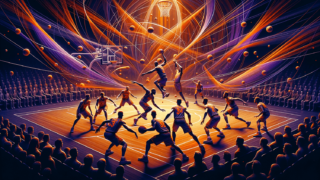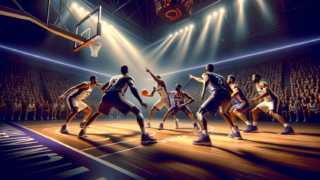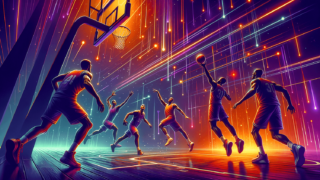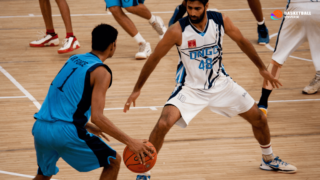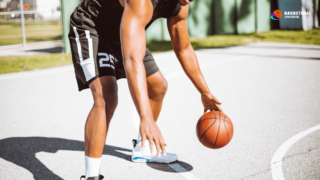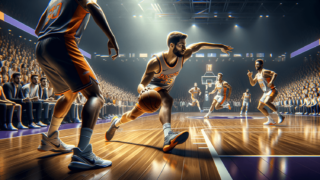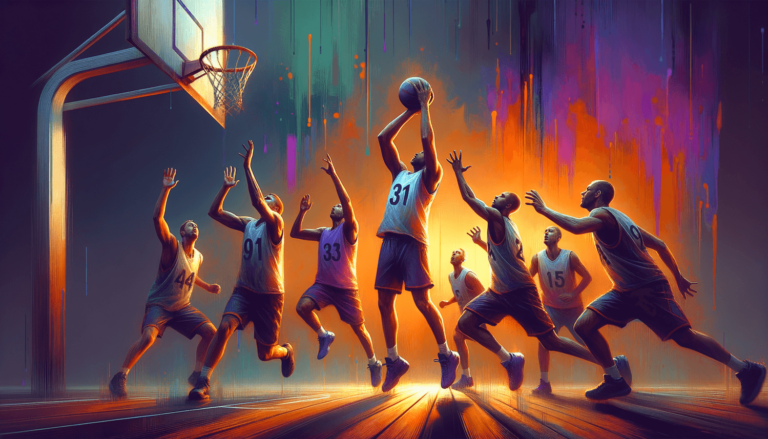
Welcome to the world of hoops, where every player at some point asks themselves, “Why do I suck at basketball?” Rest assured, you’re not alone in your pursuit of answers, and we’re here to enlighten, support, and hopefully improve your game. In this blog post, we’ll navigate through the common challenges amateur ballers experience, from weak fundamentals to psychological barriers, and provide valuable insights to help you transform from an underdog into a court conqueror. So lace up those sneakers, grab a water bottle, and let’s embark on this journey towards basketball enlightenment together!
Why Do I Suck at Basketball?
One might struggle with basketball due to underdeveloped physical skills, poor fundamentals, insufficient experience, or mental barriers such as performance anxiety or low confidence. To overcome these obstacles, focus on strengthening the basics, gaining valuable playing experience, and cultivating a resilient mindset.
Strengthening the Fundamentals of Your Game
When it comes to improving your basketball skills, laying a strong foundation with solid fundamentals is key. Let’s delve into some essential aspects every aspiring player should be working on to elevate their game.
Dribbling: The Art of Ball Control
Dribbling is the bread and butter of basketball—emphasizing ball control and ensuring fluid movement across the court. If your dribbling game is off, your overall performance will undoubtedly suffer. To improve your ball-handling skills, try different drills involving:
- Stationary dribbling with one or both hands in a crouched position, strengthening your ability to control the basketball
- Progressive drills such as Figure 8 and Spider Dribbling to develop speed and coordination
- Dribbling while running, with an emphasis on a low stance and keeping the ball close to your body
Practice these drills regularly to develop your muscle memory and increase your confidence in handling the basketball during game-time situations.
Shooting: Perfecting Your Aim
A player’s ability to shoot accurately plays a significant role in their overall success on the court. To improve your shooting skills, focus on the following:
- Establishing proper shooting form by using the BEEF (Balance, Eyes, Elbow, Follow-Through) technique
- Mastering the fundamentals of free throws, layups, and jumpers
- Practicing shooting from various positions and angles on the court
- Increasing your shooting range as your confidence grows
As your shooting fundamentals improve, your scoring ability will naturally follow, making you a more potent offensive threat on the court.
Passing: Quick, Efficient and Accurate Distribution
Passing is the cornerstone of teamwork in basketball. A well-executed pass can create scoring opportunities and keep the defense on their toes. To hone your passing skills, consider the following tips:
- Practice different types of passes (chest, bounce, overhead) in various game-like situations
- Work on the timing and accuracy of your passes through drills such as partner passing, pass and cut, or pass and screen
- Develop quick decision-making skills and spatial awareness to identify potential recipients during fast-paced games
A comprehensive understanding of passing will enable you to make smarter, quicker decisions on the court, leading to better team chemistry and a higher chance of success.
Developing Basketball IQ and Game Experience
Besides building physical skills, players must possess the wisdom to navigate the strategic complexities of basketball. Developing basketball IQ involves recognizing various game situations and understanding their nuances to make the right decisions under pressure.
Learn the Game’s Strategies and Tactics
To increase your basketball IQ, invest time in learning offensive and defensive strategies, familiarizing yourself with different playing systems, and studying common in-game situations. Some ideas on how to gain this knowledge include:
- Watching and analyzing professional games
- Attending basketball clinics or camps
- Reading books or watching instructional videos from renowned coaches and players
- Engaging in discussions with teammates or coaches to broaden your tactical vision
Playing Experience and Learning Adaptability
There’s no substitute for experience when it comes to learning how to react and adapt to a dynamic game like basketball. Gain as much playing experience as you can to develop your intuition and anticipation. Join a local team, participate in pick-up games, or sign up for tournaments to build valuable game-time knowledge.
Overcoming Mental Barriers
Refining physical skills and basketball know-how is only half the battle on the court. Your mental fortitude and emotional resilience can often make or break a game. Here’s how to keep your head in the game and cultivate a winning mindset.
Boosting Confidence and Trusting Your Abilities
Self-confidence is crucial to overcoming performance-related issues in basketball. To build confidence in your abilities, focus on the following:
- Establish a consistent routine for practicing your skills, boosting your overall competence
- Set small, achievable goals to track your progress and celebrate your accomplishments
- Visualize success in challenging situations, making mental note of areas where you need improvement
- Surround yourself with positive influences, seeking support from friends, family, and coaches
Developing self-confidence takes time, but with perseverance and a positive mindset, you’ll eventually see a substantial improvement in your basketball game.
Managing Performance Anxiety and Stress
Nerves and stress can significantly hamper performance on the court, causing focus to waver and skills to falter. Here are a few techniques to help manage performance anxiety:
- Utilize relaxation techniques, such as deep breathing, meditation, or progressive muscle relaxation to relieve tension
- Focus on the present moment instead of dwelling on past mistakes or future outcomes
- Refamiliarize yourself with the court—locate specific markings or landmarks to ground yourself in the environment
- Prioritize fun and enjoyment over winning or losing, making it easier to stay calm under pressure
Ultimately, understanding how to handle stress will prove invaluable in maintaining peak performance, regardless of the stakes involved.
There are countless reasons why one might initially struggle in basketball, but with dedication, practice, and the right mindset, the path to improvement is within reach. By addressing weaknesses in physical skills, game knowledge, and mental fortitude, you can overcome obstacles and transform your performance on the court. Soon, you’ll be saying, “I used to suck at basketball, but not anymore!”
Building Physical Fitness and Performance
Apart from mastering basketball-specific skills, one’s overall physical fitness plays a vital role in their performance on the court. From speed and agility to strength and endurance, improving these key areas can boost functional capabilities and help minimize the risk of injury.
Speed and Agility: Enhancing Athleticism
Being quick and nimble on the court is essential for both offense and defense. To improve speed and agility, consider incorporating the following drills into your training:
- Sprints: Focus on explosive movements and quick bursts of speed
- Ladder drills: Improve footwork and coordination by working through agility ladder exercises
- Shuttle runs: Develop rapid acceleration and deceleration abilities to change directions with ease
Frequent practice of these exercises will lead to noticeable improvements in maneuverability, enabling you to dazzle the court with your swift, agile moves.
Strength Training: Building Core Muscles
Strength is a critical factor in basketball, from boxing out your opponent to jumping for that crucial rebound. To enhance your muscle strength and increase your on-court efficiency, consider the following exercises:
- Squats and deadlifts: Strengthen lower body muscles, aiding in explosive movements like jumping and sprinting
- Bench press and push-ups: Build upper body strength, vital for accurate shooting and powerful passes
- Planks and core exercises: Enhance core stability to support all upper and lower body movements
Developing your strength will not only provide a noticeable power boost, but it’ll also contribute to more consistent and controlled movements on the court.
Endurance: Staying Fueled for the Entire Game
A crucial aspect of performance on the basketball court is stamina. With constant running, jumping, and quick changes in direction, maintaining a high energy level throughout the game is essential. Some recommended approaches to bolster endurance include:
- Aerobic activities: Running, swimming, or cycling will help increase cardiovascular fitness and stamina
- Circuit training: Combines strength and endurance exercises in one workout, simulating on-court energy demands
- Interval training: Alternates between high-intensity and low-intensity exercises, boosting overall endurance and recovery
Implementing endurance-oriented workouts ensures you’ll stay fresh and ready to perform optimally from the opening tip-off to the final buzzer.
Proper Nutrition and Recovery
Lastly, let’s not forget that appropriate nutrition and sufficient recovery are integral to a well-rounded basketball performance. A balanced diet and ample rest will help supercharge your basketball journey, keeping you fueled and well-prepared for every game.
Fueling Your Body
Make sure you consume a balanced diet, providing your body with the energy and nutrients necessary for rigorous training and game-day performance. Ensure your diet includes:
- Carbohydrates to fuel high-intensity exercise
- Protein to build and repair muscles
- Fats for sustained energy and the absorption of essential nutrients
- Vitamins and minerals for overall health and wellness
A balanced meal plan not only keeps you energized during practices and games but also aids muscle growth and repair, contributing to better long-term performance.
Recovery and Rest
Rest and recovery are equally important in ensuring optimal performance on the court. Adequate sleep, rest days, and active recovery techniques such as stretching, foam rolling, or massage will help avoid overtraining and minimize the risk of injury. Remember, you can’t perform your best without giving your body the rest it needs.
By spotting weaknesses in your skills, developing your physical fitness, and focusing on proper nutrition and recovery, you’ll be well-positioned to overcome obstacles and perform at your best on the basketball court.
Frequently Asked Questions
Below, we’ve compiled a list of frequently asked questions from basketball enthusiasts eager to overcome their struggles on the court. Browse through these queries to gain further insight and set yourself on the path to basketball success.
1. How long does it take to see significant improvements in my basketball skills?
The time it takes to see noticeable improvements varies based on factors such as your current skill level, the amount of consistent practice you put in, and the quality of training you receive. With dedication, discipline, and effective practice, you might see considerable improvements within a matter of months.
2. What is the best way to practice shooting?
Focus on mastering proper shooting form using the BEEF technique, and then practice a variety of shots, including free throws, layups, and jumpers, from various positions and angles on the court. Gradually increase your shooting range and consistency while ensuring your form remains intact.
3. How can I improve my basketball defense?
Key areas to work on for strengthening your defense include agility, lateral quickness, body positioning, hand placement, anticipation, and communication. Regularly practice defensive drills, such as close-out, defensive slides, or 1-on-1 challenges with a partner, to enhance your defensive prowess.
4. How can I jump higher for rebounds and blocks?
To jump higher, focus on strengthening your lower body muscles and overall athleticism by incorporating exercises like squats, deadlifts, box jumps, and plyometric jump training into your workout routine.
5. What should I be doing during the off-season to maintain or improve my skills?
During the off-season, continue to train and practice your basketball fundamentals, incorporate targeted strength and conditioning exercises, attend basketball camps or clinics to learn from coaches and peers, and participate in local pick-up games or leagues to maintain and hone your skills.
6. How important is game analysis in improving my performance?
Game analysis is crucial for understanding your strengths and weaknesses, as well as identifying areas that require improvement. Watching and analyzing professional games, reviewing your recorded gameplay, or receiving feedback from coaches and peers can provide insights and new perspectives to aid in overall development.
7. How do I choose the best pair of basketball shoes for optimal performance?
When selecting basketball shoes, consider factors such as cushioning, support, stability, traction, and fit. Choose a shoe that suits your playing style and personal preferences, ensuring comfort, protection, and functionality on the court.
8. Can I play multiple sports alongside basketball without hindering my growth in the sport?
Playing multiple sports can actually contribute to overall athleticism and skill development, improving your coordination, balance, movement, and more. Just ensure you allocate enough time and effort to basketball training and practice to maintain consistent progress.
9. How important is stretching and warming up before playing?
Stretching and warming up are crucial in preventing injuries and preparing your body for the physical demands of basketball. They increase blood flow, range of motion, and flexibility, allowing for optimal performance on the court.
10. What is the best way to find a basketball coach or mentor to help me improve my game?
Joining local basketball clubs, recreational leagues, or attending basketball camps can provide access to qualified coaches and mentors. You can also seek recommendations from friends, family, or online reviews to find professionals who align with your goals and expectations.
11. How can I work on my confidence on the court?
Build confidence by establishing a consistent practice routine, setting achievable goals, visualizing success, and seeking support from a positive network of friends, family, coaches, and teammates. Remember that confidence takes time to develop, so be patient and trust yourself.
12. How can I stay motivated and disciplined to train consistently?
Stay motivated by setting realistic goals, tracking your progress, celebrating victories, maintaining an enjoyable training environment, and seeking inspiration from role models or peers. Remember, personal growth and development are key motivators, so embrace the journey to basketball success.
13. How can I develop better communication with my teammates during the game?
Improve on-court communication by consistently attending team practices, building trust and rapport with teammates, honing your verbal and non-verbal communication skills, and being proactive in offering encouragement and constructive feedback. A cohesive team dynamic is vital for overall success.
Featured Posts
- No pillar pages found.
